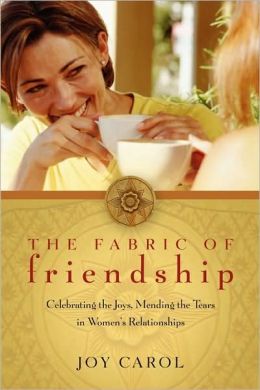"All too often we take friendships for granted, believing that we don’t have to make an effort or put in much energy, time, or resources to be a good friend or to have one. So we don’t nurture or take care of our relationships, and before we know it, they have somehow slipped to ‘the back burner’ of our lives. Most of us wouldn’t do this with our children, our families, our spouses, our partners, our colleagues at work. Yet we easily and repeatedly do it with our friends. At times we let our relationships completely drift away because something 'more important' comes along, like a love relationship, marriage, children, a job, even a pet. Needless to say, all of this adds up to a surefire formula for disappointment and failure in our friendships. . . .
"Fortunately there is good news as well. Many people who have experienced challenges and difficulties have found workable solutions, giving us confidence that we too can resolve some of the pitfalls we encounter. In the process, we may discover new ways of working through and transforming concerns that arise in our relationships. Without a doubt, we can avoid being disappointed by relationships that don’t meet our expectations or that slip away. And we can reclaim the power of our friendships and make them better, stronger, more genuine.
"We start by recognizing that meaningful friendships — the kind that you can count on — are not simple nor are they effortless. They can be challenging and complicated. But is there anything in life that doesn’t take an effort or is completely trouble-free — marriage, families, love relationships, jobs, politics, religion, life, living? We also need to realize the importance of having a fairly clear sense of who we are. Friendships are enhanced when we know ourselves and have a sense of self-confidence. This is basic to resolving problems that emerge in relationships.
"So rather than having envy about someone’s talents and accomplishments, we can examine and improve our own skills. Instead of competing in a toxic way, we might try identifying and enhancing our abilities and then choose if and how to compete in a healthier manner. To avoid inappropriate anger, we will benefit if we recognize how we have been wounded and learn how to heal our pain. If someone walks all over us, we can establish boundaries based on who we are or who we want to be. And expressing our real feelings and needs is essential, because we are worthy people. . . In addition to these, most people feel better about who they are if they do some kind of meaningful work, help a neighbor, sign up to do volunteer work, join a singing group, participate in sports, reach out to those in need. People who have a sense of compassion and are involved with caring for others almost always discover that they lose some of their fears, their insecurities, their 'negative stuff' in the process. When we do feel good about ourselves, our whole outlook on life changes and we are better, more mature friends."
